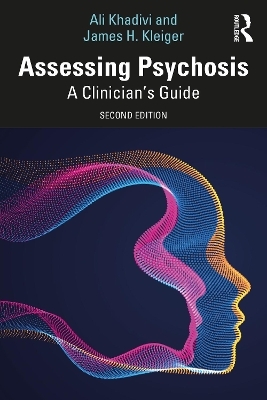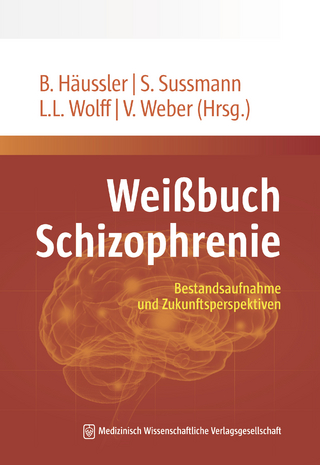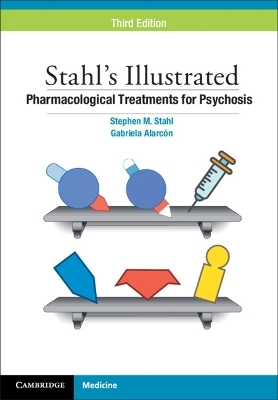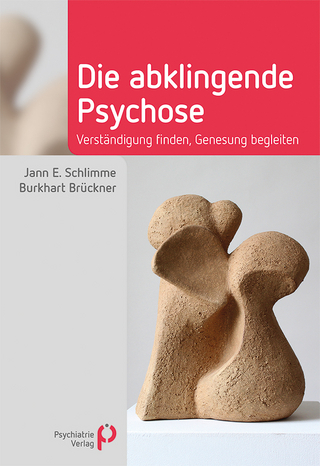
Assessing Psychosis
Routledge (Verlag)
978-1-032-54085-6 (ISBN)
This second edition of Assessing Psychosis: A Clinician’s Guide offers both a practical guide and rich clinical resource for a broad audience of mental health practitioners seeking to sharpen their understanding of diagnostic issues, clinical concepts, and assessment methods that aid in detecting the presence of psychotic phenomena. Case vignettes deepen clinical understanding, and all chapters include a summary of practical clinical guidelines. This new edition includes two new chapters and updated diagnostic criteria considering the new DSM-5-TR. Practicing psychiatrists, psychologists, social workers, psychiatric nurses and students will find this a valuable resource for clinical practice, training, and teaching purposes.
Ali Khadivi, Ph.D., ABAP, received his Bachelor of Science in Psychology from Tufts University and his Ph.D. in Clinical Psychology from The New School for Social Research. He completed his training at New York Hospital-Cornell Medical Center, Westchester Division, with distinction. He has been practicing clinical and forensic psychology since 1991. Dr. Khadivi is board-certified in assessment psychology and holds the rank of professor of psychiatry and behavioral sciences at Albert Einstein College of Medicine in Bronx, New York. He teaches clinical and forensic psychological assessment at several hospitals and universities and provides training workshops nationally and internationally in the evaluation of major mental illnesses. Dr. Khadivi has been a clinical and forensic consultant for numerous institutions and offers expert testimony in criminal and civil forensic cases. James H. Kleiger is a native of Colorado and a graduate of Harvard University. He received his doctorate at the University of Denver. Dr. Kleiger completed postdoctoral training at The Menninger Clinic in Topeka, Kansas, and eventually became Training Director of the Postdoctoral Fellowship Program. While at Menninger, he completed his psychoanalytic training at the Topeka Institute for Psychoanalysis and, after moving to Maryland, served as President of the Washington-Baltimore Society for Psychoanalysis. He has authored and edited many books, such as Assessing Psychosis. A Clinician’s Guide, 1st and 2nd Editions, 2015 and 2024 (Routledge, co-authored with Ali Khadivi), and Rorschach Assessment of Psychotic Phenomena, 2017 (Routledge).
Part I: Clinical Features of Psychosis 1. Observing and Listening to the Psychotic Experience 2. Understanding Core Psychotic Symptoms 3. Charting the Course of Psychotic Episodes Part II: Diagnostic Concepts 4. Diagnostic Classification: Past and Present 5. Diagnostic Categories or Dimensions 6. Differential Diagnosis of Psychotic Disorders Part III: Assessing Psychosis 7. Assessing Psychotic Dimensions with Clinical Interviewing 8. Assessing Psychotic Dimensions with Psychological Testing 9. Assessing Psychotic Dimensions with Research-Based Instruments Part IV: Special Issues and Population 10. Assessing Psychosis in a Cultural Context 11. Assessing Psychosis Proneness, Prodrome, and High-risk factors 12. Assessing Suicide Risk in Psychosis 13. Assessing Violence Risk in Psychosis 14. Assessing Psychosis in Children and Adolescents 15. Assessing and Differentiating Extreme Pollical Belief from Delusions 16. Assessing Psychosis in a Forensic Mental Health Context 17. Assessing the Diversity of Psychotic Experience: A Recap and Look Ahead
Part I: Clinical Features of Psychosis 1. Observing and Listening to the Psychotic Experience 2.Understanding Core Psychotic Signs and Symptoms 3.Charting the Course of Psychotic Episodes Part II: Diagnostic Concepts 4.Diagnostic Classification: Past and Present 5.Diagnostic Categories or Dimensions 6.Differential Diagnosis of Psychotic Disorders Part III: Assessing Psychosis 7.Assessing Psychotic Dimensions with Clinical Interviewing 8.Assessing Psychotic Dimensions with Psychological Tests 9.Assessing Psychotic Dimensions with Research-Based Instruments Part IV: Special Issues and Population 10.Assessing Psychosis in a Cultural Context 11. Attenuated Psychosis, Psychosis-Proneness & Risk Factors for Psychotic Illness 12. Assessing Psychosis in a Forensic Context 13.Differentiating Delusional Disorder from the Radicalization of Extreme Beliefs 14.Assessing Suicide Risk in Psychosis 15.Assessing Violence Risk in Psychosis 16.Assessing Psychosis in Children and Adolescents
| Erscheinungsdatum | 10.07.2024 |
|---|---|
| Zusatzinfo | 10 Tables, black and white |
| Verlagsort | London |
| Sprache | englisch |
| Maße | 152 x 229 mm |
| Gewicht | 635 g |
| Themenwelt | Geisteswissenschaften ► Psychologie ► Psychosen |
| Medizin / Pharmazie ► Medizinische Fachgebiete ► Psychiatrie / Psychotherapie | |
| ISBN-10 | 1-032-54085-0 / 1032540850 |
| ISBN-13 | 978-1-032-54085-6 / 9781032540856 |
| Zustand | Neuware |
| Informationen gemäß Produktsicherheitsverordnung (GPSR) | |
| Haben Sie eine Frage zum Produkt? |
aus dem Bereich


